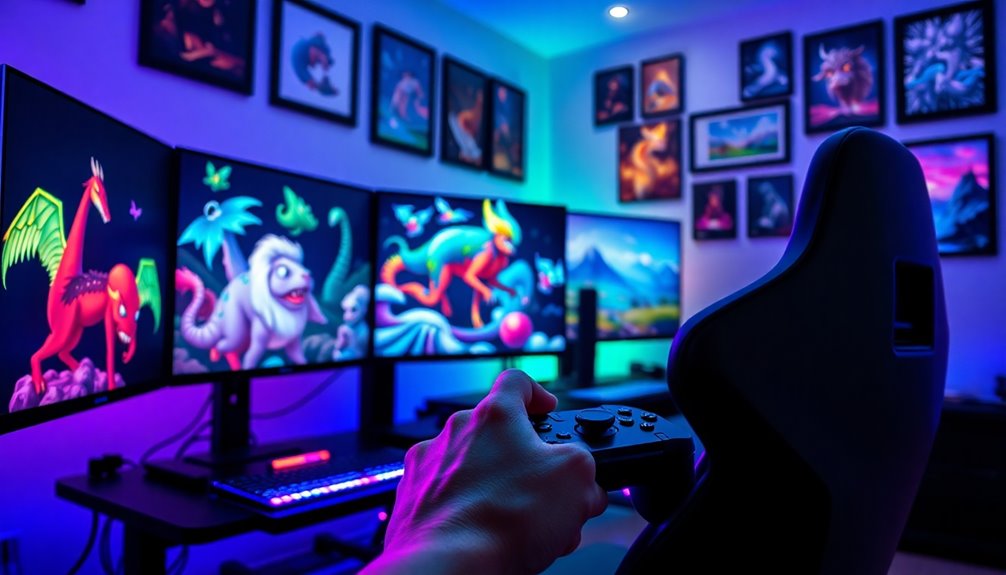An NFT game is a digital platform where you can own, trade, and earn unique virtual assets through non-fungible tokens (NFTs). Using blockchain technology, these games allow you to secure true ownership of in-game items, like characters or skins. You can buy, sell, or trade these assets, often earning cryptocurrency as you play. The play-to-earn model transforms gameplay into a revenue-generating activity, making your gaming experience potentially lucrative. NFT games create exciting opportunities for interaction and investment. If you're curious about how these games work and their impact, keep exploring to uncover more insights.
Key Takeaways
- NFT games utilize blockchain technology to provide players with true ownership of unique digital assets through non-fungible tokens.
- Players can earn, buy, sell, and trade in-game assets, often generating real-world value through a play-to-earn model.
- Smart contracts ensure secure transactions and transparency in the ownership and transfer of digital collectibles.
- Interoperability allows players to use their assets across different games, enhancing the overall gaming experience.
- While offering innovative mechanics, NFT games also face challenges like environmental concerns and potential economic imbalances.
Core Concepts of NFT Games
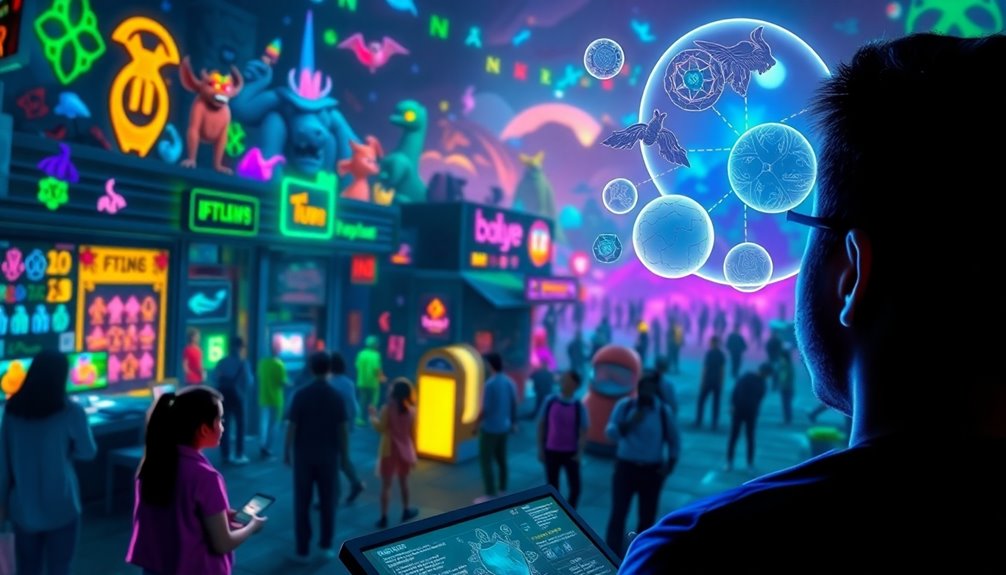
In NFT games, players dive into a digital realm where they can truly own unique assets, thanks to non-fungible tokens (NFTs) verified on a blockchain.
These games integrate innovative game mechanics that allow you to earn, buy, sell, or trade unique digital assets like characters and skins. The play-to-earn model, seen in titles like Axie Infinity, creates real-world value through your gameplay.
Smart contracts ensure transparency and security in these transactions, giving you verifiable ownership of your digital collectibles.
As the NFT gaming market grows, revenue models are evolving, reshaping traditional gaming economics.
Plus, interoperability means you can use your assets across different platforms, enhancing your gaming experiences while fostering a decentralized environment within NFT marketplaces.
Defining NFT Game Mechanics
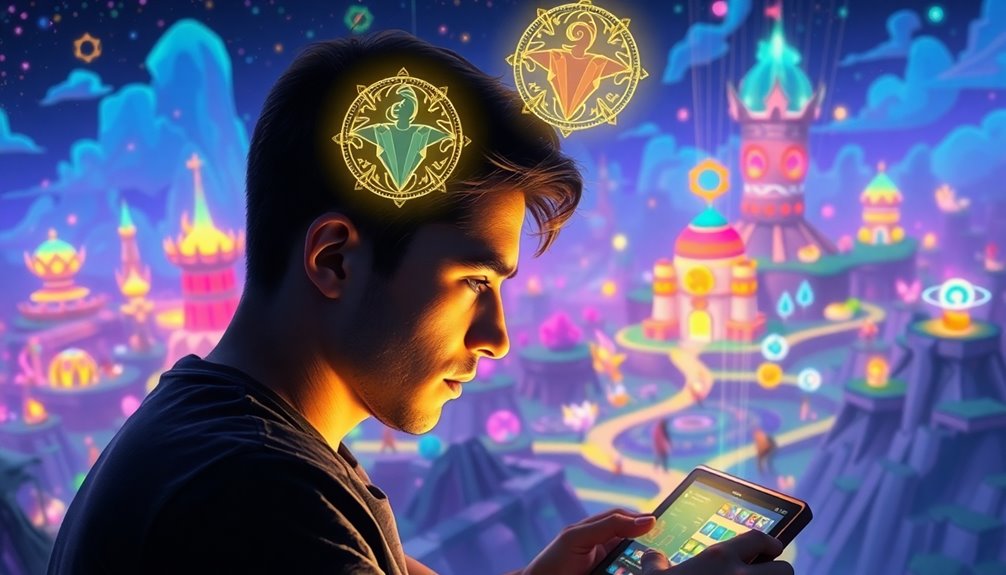
While exploring NFT games, you'll discover unique mechanics that set them apart from traditional gaming experiences. These games utilize blockchain technology, allowing you to buy, sell, and trade unique digital assets like characters and in-game items.
The play-to-earn model rewards your in-game activities with cryptocurrency, making gameplay financially rewarding. Smart contracts govern the NFTs, ensuring secure and transparent transactions within the gaming ecosystem.
The embedded metadata in these tokens enhances their rarity and value, distinguishing them from conventional in-game items. NFT game developers create engaging experiences, as seen in notable titles like Axie Infinity and CryptoKitties, where you can breed, battle, and trade digital collectibles for real-world benefits.
Engaging with these mechanics opens up new dimensions in gaming.
In-Game Asset Ownership Mechanics
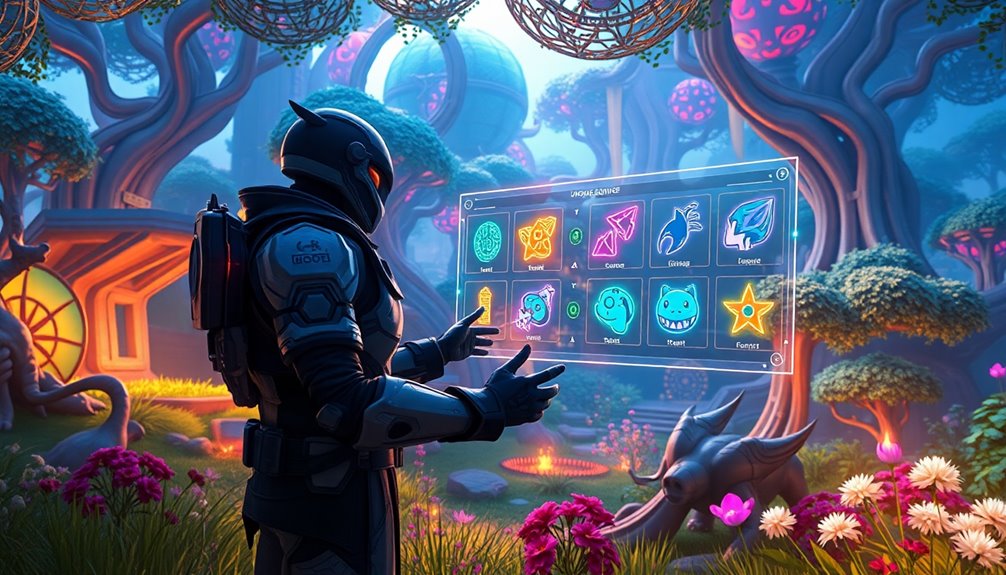
As you dive into the world of NFT games, you'll quickly realize that in-game asset ownership mechanics fundamentally change the way players interact with their virtual possessions.
With NFTs, you gain verifiable ownership of unique digital assets like characters, skins, and weapons, all securely stored on blockchain technology. This means your in-game assets can't be replicated or altered, giving you true ownership.
Smart contracts manage the creation and transfer of these NFTs, ensuring transparency in trades. Additionally, the play-to-earn model allows you to monetize your gaming experiences, potentially earning cryptocurrency from your achievements.
Plus, interoperability across different games enhances the value of your digital assets, making them even more appealing in the ever-evolving landscape of gaming companies.
Pros and Cons Overview

NFT games come with a mix of enticing advantages and notable drawbacks that shape the player experience.
The play-to-earn model allows you to earn real-world value from in-game assets, fostering player ownership and opening new revenue streams.
However, these games face environmental concerns due to the significant energy consumption of blockchain technology.
Additionally, accessibility issues may arise for players unfamiliar with this tech, which can hinder widespread engagement.
The economic model of NFT games can also lead to imbalances, creating a pay-to-win scenario where some players exploit the system for profit, undermining fair competition.
Balancing these pros and cons is essential for understanding the evolving landscape of NFT gaming.
Traditional vs. NFT Gaming
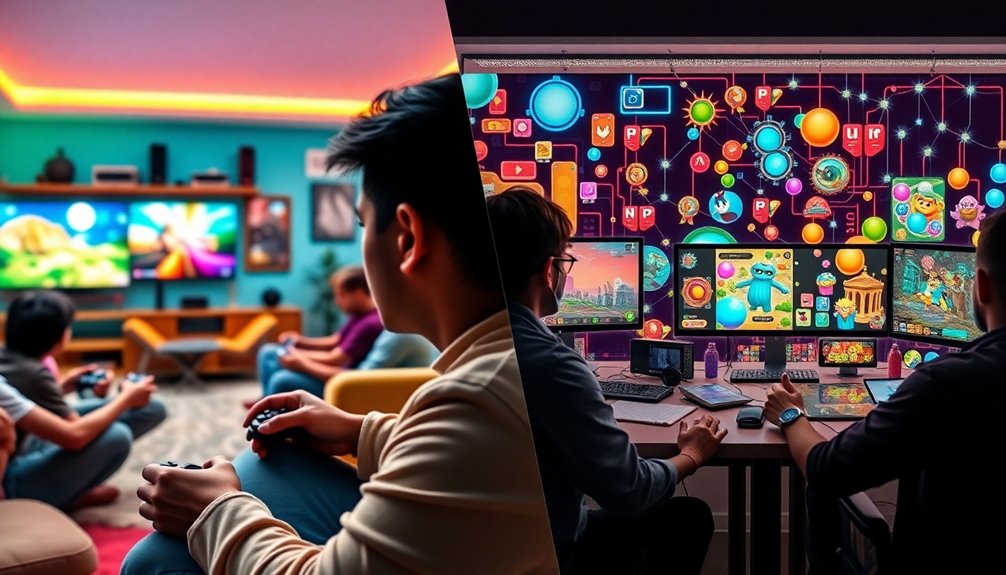
When comparing traditional gaming to NFT gaming, it's clear that a significant shift in player ownership and economic structure has taken place.
Unlike traditional gaming, where you don't truly own in-game assets, NFT games utilize blockchain technology to give you real asset ownership through unique digital tokens.
This shift allows you to engage in a play-to-earn model, turning gaming experiences into revenue generation opportunities.
Traditional games rely on one-time purchases, while NFT games generate income through in-game purchases and secondary sales.
Moreover, NFT games foster a decentralized ecosystem, shifting control to players, and offer interoperability, enabling you to use assets across different games and platforms.
This evolution fundamentally changes how you interact with and benefit from gaming. Additionally, the integration of data analytics in NFT games can enhance user engagement and improve overall gameplay experiences.
Market Volatility Impacts Investments

The rapid growth of the NFT gaming market brings exciting opportunities, but it also exposes players and investors to significant risks due to market volatility.
The NFT gaming industry generated nearly $5 billion in revenue in 2021, yet fluctuations can drastically affect the perceived value of in-game assets. This volatility can lead to economic instability, especially with the play-to-earn model requiring a steady influx of new players to sustain token economies.
Major hacks, like the $600 million theft from Axie Infinity in 2022, have shaken investor sentiment and confidence. Additionally, environmental concerns and regulatory scrutiny can trigger sudden market shifts, further influencing the stability of your investments in this rapidly evolving space.
Emergence of Play-To-Earn Models
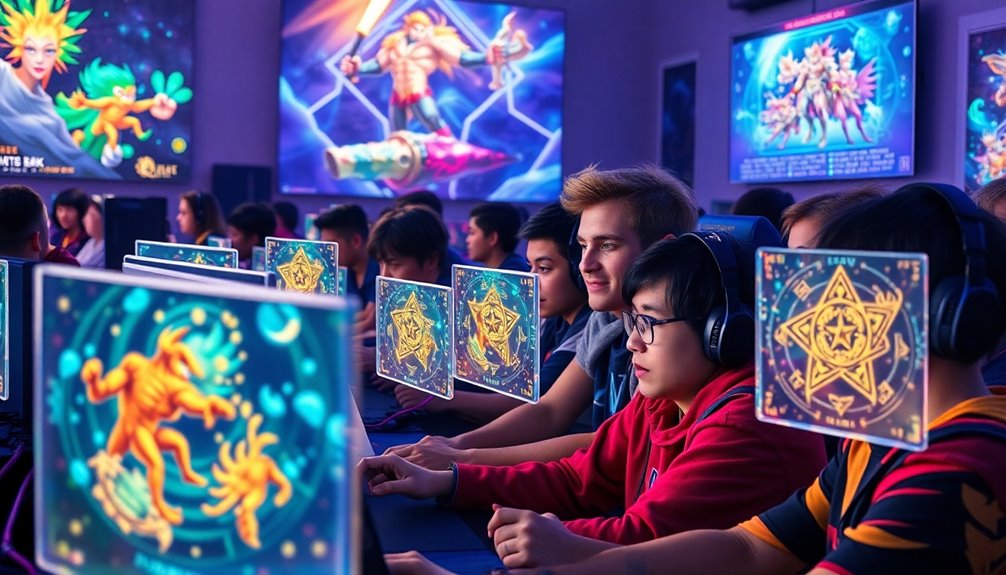
As gaming evolves, the emergence of Play-To-Earn (P2E) models is transforming how players interact with digital environments.
Play-to-earn NFT games let you earn real money through in-game activities, turning gaming into a potential income source. In 2021 alone, these games generated nearly $5 billion, showcasing their financial viability.
Players in titles like Axie Infinity reported monthly earnings exceeding $2,000, highlighting substantial economic opportunities.
With blockchain technology enabling true ownership of unique in-game assets, NFT games allow players to trade digital items for real-world value.
As the gaming industry embraces these models, the market for P2E games is projected to reach $8.86 billion by 2028, attracting everyone from casual gamers to serious investors.
Utilize Community Feedback Effectively
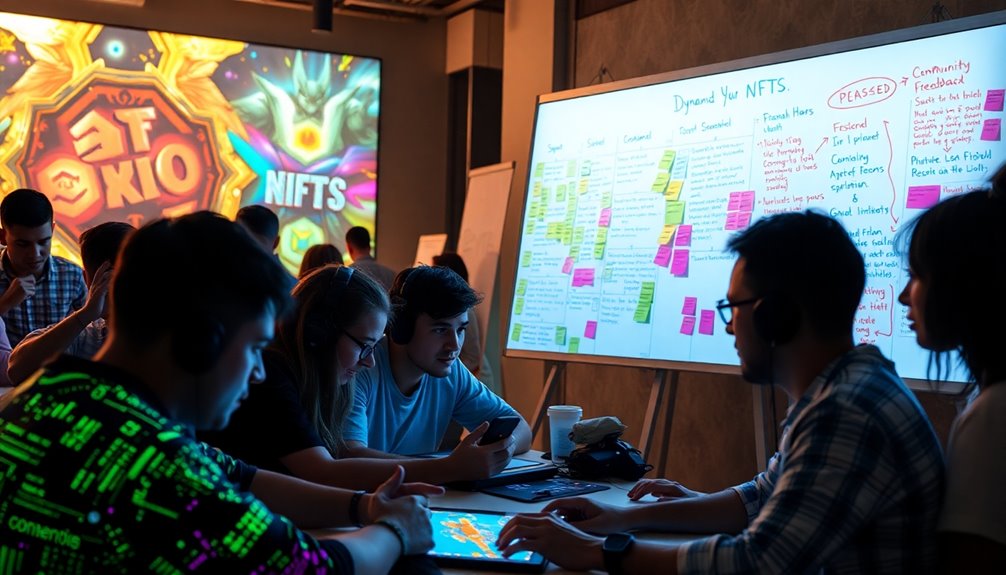
Community feedback plays a pivotal role in shaping the future of NFT games, especially as players seek a more immersive and rewarding experience.
By actively gathering player insights through surveys and polls, you can enhance game development and align features with player preferences. Utilizing platforms like Discord or Telegram for real-time communication fosters direct developer interaction, allowing you to make quick adjustments based on community input.
Regular community events encourage ongoing dialogue, building trust and loyalty among players while helping identify potential issues early. Analyzing trends in player feedback can guide you toward popular features and highlight areas needing improvement, ultimately driving player retention and satisfaction in the NFT gaming ecosystem.
Embrace community feedback to create a thriving gaming experience.
Frequently Asked Questions
What Does NFT Mean in Games?
In games, NFT means you've got unique digital assets that represent ownership of items or characters. Each NFT is distinct, ensuring no two are alike, which adds to their value.
You can buy, sell, or trade these NFTs on open marketplaces, allowing you to monetize your gaming experience.
What Is an Example of a NFT Game?
One example of an NFT game is Axie Infinity. In this game, you breed, raise, and battle fantasy creatures called Axies. You can earn real income through gameplay, with some players raking in over $2,000 monthly.
Another example is Gods Unchained, a trading card game where you own unique cards as NFTs.
Both games highlight how digital assets can create real-world value while offering engaging gameplay experiences.
What Does NFT Stand For?
NFT stands for "Non-Fungible Token." It means that each token is unique and can't be exchanged on a one-to-one basis like cryptocurrencies.
You'll find NFTs used to represent digital assets, ensuring they've distinct properties and ownership verified through blockchain technology.
This uniqueness offers proof of authenticity, so you can own digital art, music, or even in-game items, making NFTs a fascinating development in the digital asset landscape.
What Is the Concept of NFT in Games?
In games, NFTs represent unique digital assets that you can own, trade, or sell. Each NFT, created through smart contracts on a blockchain, guarantees its uniqueness and verifiable ownership.
You can earn NFTs by playing, completing tasks, or achieving milestones, and they often take the form of in-game items like characters or skins.
This concept allows you to monetize your gaming experience, turning your skills and efforts into real-world value.
Conclusion
In conclusion, NFT games blend the excitement of gaming with true ownership of in-game assets, creating a unique experience. While they offer lucrative play-to-earn opportunities, the market's volatility can impact your investments significantly. By understanding the mechanics and staying informed about community feedback, you can navigate this evolving landscape more effectively. Embrace the potential of NFT games, but remember to weigh the pros and cons as you embark on your gaming journey.
